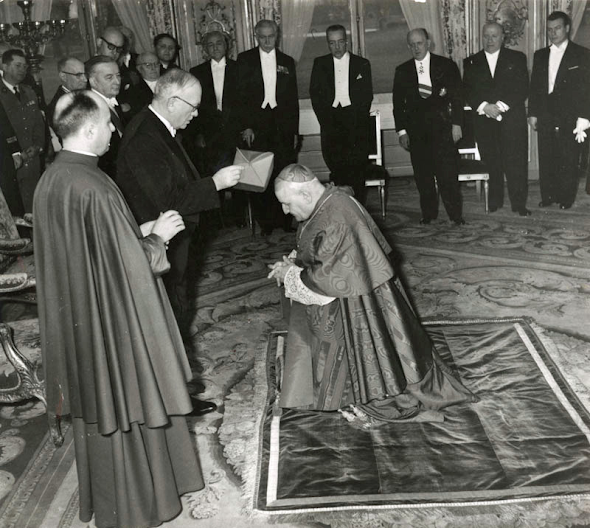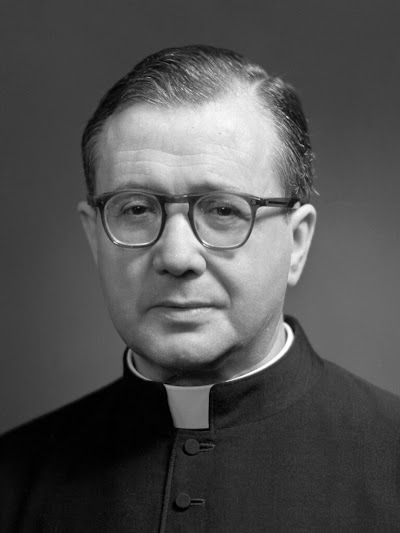What John XXIII REALLY said on his deathbed
The claim is often heard that John XXIII, allegedly remorseful on his deathbed about ever having convoked the
Council and wishing to put an immediate stop to the unbridled revolution
with its contemptuous spirit for the venerable Tradition of the Church then
underway by radical progressivists such as Cardinal Suenens, Yves Congar, Hans
Küng, Karl Rahner, and Joseph Ratzinger (to name just a few), cried “Stop the
Council! Stop the Council!”. Is there any truth to this claim? On the face of
it, the claim sounds more than a little dubious, and when considered with just
some care to the facts is shown to be patently false. For Angelo Roncalli/John XXIII is the
same man who welcomed theologians such as Karl Rahner, Yves Congar, and others,
previously suspected of heresy by the Holy Office, to be Conciliar theological periti. Furthermore, John XXIII himself
had somewhat of a reputation as a progressive, particularly after the
publication of the encyclical Pacem in
Terris on April 11, 1963, which drew universal praise around the world from
freethinkers of all stripes ranging from “conservative” Freemasons to
communists. And we here find that, as is often the case, whatever sounds dubious, turns indeed to be not merely dubious, but manifestly
false when researched carefully.
So, what exactly did Angelo Roncalli/John XXIII state as he
lay at death’s door? Let us see what Angelo Roncalli’s biographer, Peter
Hebblethwaite, has to say in his work, “John XXIII: Pope of the Council” (Geoffrey Chapman - London, 1985, pp
501-502). After expressing some pious sentiments and recalling his early
priestly vocation, he goes on to remember fondly his modernist mentors who
guided him in the early years of his priesthood: “Along the way I’ve met holy
priests and good superiors. Oh! Don Francesco Rebuzzini, monsignor Radini[-Tedeschi], cardinal
Ferrari…all helped me and loved me. I had lots of encouragement.” Next, he
makes the surprising remark that, after more than 80 years of earthly existence
as a sinner in this valley of tears he is unaware of having offended anyone, but begs forgiveness if such has been the case, “For my part,
I’m not aware of having offended anyone,
but if I have, I beg their
forgiveness…” (Apparently, he never offended Christ for opening the windows of
the Church during Vatican II to the odious stench of modernism, neither did he
offend the millions of Christian souls suffering under the boot of communist
barbarism, or those languishing in communist prisons or the Soviet Gulag by
refusing to condemn the most evil ideology then in existence, namely
communism). The all-important work of the Council had made a sure, solid start
and was set to continue with his next successor; Roncalli’s mission on earth was
complete and his conscience was clear before God: “In this last hour I feel
calm and sure that my Lord, in his mercy, will not reject me.” For Roncalli,
intentionally giving free license to the Conciliar revolutionaries in order to
pillage and plunder the sacred treasures of the Church had served the causes
of, “truth, justice, and charity”: “Unworthy though I am, I wanted to serve
him, and I’ve done my best to pay homage
to truth, justice, and charity…” He next goes on to express a wish for the
false “unity” preached and promoted by Freemasonry to finally descend upon
mankind, even though the Church teaches that that unity is already fully
present within the Holy Catholic and Apostolic Church. From this false search
for a “unity” already in existence, came the inspiration for the false ecumenism
thoroughly permeating the “spirit” of the Council – also one of Freemasonry’s
projects –, which was as it were its beating heart and one of its guiding
principles that would finally bring a Utopian “peace” to mankind (hence the
later “Spirit of Assisi” and its calls for peace): "My time on earth is
drawing to a close. But Christ lives on and the Church continues its work.
Souls, souls. Ut unum sint! Ut unum sint! [i.e.: may they be one!]" But that is not
all. To members of the curia and the cardinals coming in to pay their last
respects he expressed the hope, not that
the Council would be stopped, but that it would be successfully concluded:
“…I’m
sure the bishops will bring the Council to a happy conclusion”!
Regarding
his modernist mentors whose memory he fondly recalled, we point out that
Radini-Tedeschi was the bishop of Bergamo who took Roncalli under his wing as
his private secretary. Working as a professor of ecclesiastical history in
Bergamo’s seminary, Roncalli would teach from the overtly modernist History of the Early Church by the
modernist Duchesne. St Pius X complained bitterly that nowhere in all of Italy
was the modernist History so
widespread among the clergy as in the diocese headed by the modernist friendly
Bishop Radini-Tedeschi. Cardinal Andrea Carlo Ferrari of Milan who Roncalli
also mentioned as one of his guiding mentors also led a diocese heavily
influenced by the modernism then spreading like wildfire, particularly among
the younger clergy. Ferrari thus had a rocky relationship with St Pius X for
his dubious orthodoxy and for his hesitancy to engage in the combat against
modernism in his diocese.
But let us consider, for prudence’s sake, that perhaps, just perhaps, these were the mindless ravings of a poor man at death’s door whose mind was hopelessly clouded by the ravages of the terminal stages of cancer and thus unable to think through things clearly. Perhaps in the months before his death he had been having second thoughts about the prudence and necessity of convening the Council? Quite the contrary. In an address delivered on December 8, 1962 he said that the first session of the Council, “had been like a slow and solemn introduction to the Council – a generous willingness to enter into the heart and substance of the divine plan.” (ibid, p 464) His last words were an expression of undimmed optimism for the fruits that the Council would give forth. To him, it seemed as though the Heavenly court itself was looking down from on high in approval as the Council progressed: “the heavens are opened above our heads, and the splendour of the heavenly court shines down upon us.” (ibid, p 466) And finally, in order to ensure that the Council would be continued in exactly the same rebellious spirit as was observed in the first session, John XXIII told the editor of Civiltà Cattolica on February 9, 1963 that in the short time he had to live before his own death he had to do everything possible, ”to prevent the conclave after my death being a conclave ‘against me’, because then it might make a choice that would destroy everything I have started to achieve.” (ibid, p 475) Let us take this opportunity to “bust” another myth surrounding Roncalli and his (not the Church’s) pseudo-Council. As recently as 2020, the Rorate Caeli weblog published an interview called an “expose” with Fr Charles Murr on “Mother Pascalina, Bugnini, Paul VI, and Other Major Figures”. Here, Fr Charles Murr contends that, “Roncalli originally wanted a Council that would begin and end in three months’ time and he hoped to close it with the beatification of Papa Mastai-Ferretti (Pius IX of Vatican I)!” Both points made here are false: 1) Roncalli was in no hurry to have the Council finished, and as pointed out above, he was quite happy to describe the first session as a “slow and solemn introduction to the Council”. 2) It was not “Papa Mastai-Ferretti” that Roncalli was in a hurry to beatify, but his old philo-modernist mentor, Cardinal Ferrari of Milan (ibid, p 475). On the contrary, according to Msgr Capovilla’s account (Roncalli’s private secretary), he continually and intentionally kept delaying Pius IX’s beatification under specious pretenses (ibid, p 465).
We believe to have
found the original source of the “Stop the Council!” myth; not the exact words,
for which we have found no properly cited reference, but the mind-set which set
the “stage” for some crafty individual to come up with the words out of thin
air, and (alas) repeated endlessly ad
nauseam ever since. In her work, The
Desolate City: Revolution in the Catholic Church Anne Roche
Muggeridge describes a perfectly orthodox John XXIII whose only desire was to
give some fresh air to the Church through the Council: “There is no hint in his life or words
[!] that the ‘Good Pope John’ who touched off the revolution had anything more
in mind by aggiornamento than a
modernization and simplification of procedures and disciplines, a kind of
cheerful spring-cleaning of all the Church’s treasures…”, while the hapless and
sadly clueless Roncalli “seems not to have understood the new meaning the word
‘ecumenism’ had taken on.” (The Desolate
City, Harper & Row, 1986, p 72). Here is the most relevant quote, the
one that deals directly with the aforementioned myth: “When, during the rebellious first session of the Council, he realized
that the papacy had lost control of the process, he attempted, as Cardinal John
Heenan of Westminster later revealed, to organize a group of bishops to try to
force it to an end. Before the second session opened he had died.” The
reference provided for this completely unfounded statement is a “letter”
written by a certain Rev. Joseph W. Oppitz directed to America magazine found in the edition from 15 April 1972. That is, this
is not even a direct account of events by the one who supposedly witnessed
them, Card. Heenan himself. Muggeridge, it turns out, was a staunch supporter
of John Paul II, the man influenced by the gnosis
of Steinerian anthroposophy handed down to him by figures like his old mentor
and friend Kotlarczyk. One cannot help but cringe when reading such statements
by Muggeridge about John Paul II so totally disconnected from reality: “The
revolution within the Catholic Church and its supporters without have from his
election directed at John Paul II a stream of vituperation unparalled in modern
times” (ibid, p 150); she expresses
clear evidence for “…the Holy Ghost’s
hand in the choice of John Paul II” (!); “The election of John Paul II marks the point at which the idea of
counter-revolution became tenable. I shall here touch briefly on the pope’s
counter-revolutionary program…”; “…the Pope puts first things first. For him doctrine is the all important thing”;
“John Paul II, through his missionary
travels and his understanding of modernity, has dispelled the post-Conciliar
confusion.” (ibid, p 152) And, given these
statements, it is probably no surprise to learn that Muggeridge was an equally
enthusiastic supporter of the Kabbalah inspired sexual gnosis of Karol Wojtyla, his so called “Theology of the Body”
reminiscent of the gnosis found in
such Kabbalistic texts as the Zohar.
This is indeed the so called “counter-revolutionary program” of Karol Wojtyla
that clueless neo-Catholics like Muggeridge were enthusiastically applauding at
the time.
The myth of an Angelo Roncalli desperately pleading for his
pseudo-Council to be brought to a speedy conclusion, therefore, appears to have
its genesis and support in neo-Catholics and pseudo-traditionalists who are
quite content in believing that Vatican II did not indeed introduce any
novelties or new doctrine into the Church, that all the chaos and disarray that
followed in the wake of the Council was due to the media’s “virtual Council” overtaking
the “real Council” (a myth apparently first proposed by Joseph Ratzinger, but
defended by figures such as Roberto de Mattei); people who enthusiastically
express their admiration for the deeds and purported orthodoxy of “St” John
Paul II by adding “The Great” to his name (!), and so on. It is from this false traditionalism and lukewarm Catholicism that we must be on our guard against.






Can I transform this text into audio and post it on youtube giving you, and the website all the due credits?
ReplyDelete